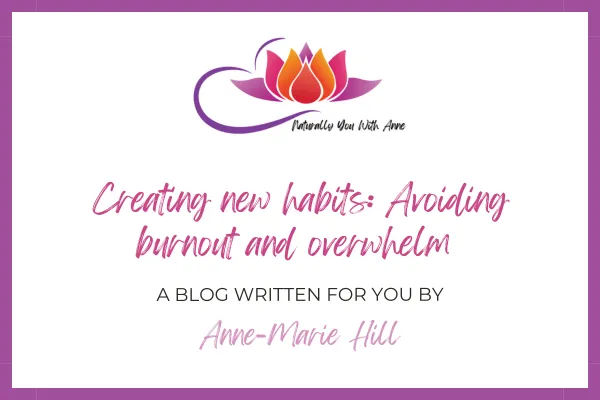
Creating new habits: Avoiding burnout and overwhelm
As someone who gets very easily overwhelmed, at times I have struggled to keep up with the number of ideas and suggestions that I feel I am bombarded with, especially online, from coaches, mentors, guides etc.
I have often felt like, “how am I supposed to fit all of that in to my already busy schedule?”
Leaving me feeling more frustrated, even more overwhelmed and then despair, thinking that, if I don’t do all of those things, I won’t get to a place where I feel more confident, less anxious etc.
Have you ever felt like that?
Years ago I read a book called Atomic Habits by James Clear.
Such a great book. I highly recommend it.
The tagline on the book is:
“An easy & proven way to build good habits and break bad ones”
I knew that this was going to be the book for me.
The whole book is really insightful and very thought provoking, but, the 2 main stand out points for me were 2 principles to forming and cementing good habits.
Implementation Intention
How many times have you said that you were going to do something or even go and see someone, but you never get round to doing it?
There was a study held in 2001 in the UK, where researchers began working with 248 people to build better exercise habits over the course of 2 weeks.
They were divided into 3 groups:
Group 1: Were simply asked to track how much they exercised.
Group 2: Were asked to, not only track their exercise, but were also given material to read about how exercise is good for their heart, how it can reduce the risk of coronary heart disease and improve heart health.
Group 3: These received the same presentation as Group 2 but, as well as that, they were asked to create a plan as to WHEN they were going to exercise over the following week.
Specifically, the participants in this group were asked to complete this sentence:
“During the next week, I will partake in at least 20 minutes of vigorous exercise on [DAY] at [TIME] in [PLACE].
In groups 1 and 2, 35-38% of people exercised at least once a week.
In group 3 - 91% of those members exercised at least once a week.
An interesting point to note - even though group 2 was given that motivational presentation, it didn’t have any real affect with regards to their level of exercise.
Just goes to show, that, even when we know something is good for us, it’s not always motivating enough to do the thing.
And so, if you are looking to create a new habit, be specific about what it is that you want to do and, importantly, when and where you are going to do it.
Use this sentence to help you:
I will [BEHAVIOUR] at [TIME] in [LOCATION]
For example:
“I will exercise for 40 minutes at 8am in my local gym”
Habit Stacking
James goes into a lot more detail about where this theory comes from in the book, I will let you read that for yourself, but, basically, he talks about how human behaviours follows a cycle how, for example, one purchase will lead to another.
Have you ever bought a new outfit and then bought new shoes, bags, accessories to match?
This theory can also be applied to creating habits.
We often decide what to do next by what we have just finished doing.
For example, after you get up you make your bed, then you go downstairs to make a drink, then remember that you need more tea bags so you add them to your shopping list etc etc.
No behaviour happens in isolation. Each one becomes a trigger for the next one.
We can use this to our advantage when creating and incorporating new habits into our routines.
How it works is to think of a current habit you already have and then add the new habit on top of that.
So, for me, I love to listen to podcasts, but I feel like I don’t get chance to do that so much when I am at home.
And so, I have created a habit stack that says that, when I go to the gym, I will listen to my favourite podcasts.
That has become so ingrained that I cannot imagine going to the gym without doing that.
My earphones are the first thing I put in my gym bag!
There is a formula to help you with this one, too:
After [CURRENT HABIT], I will [NEW HABIT]
Eg. “After I get to the gym, I will listen to my favourite podcast”
Eg. “After I make my morning cup of tea, I will meditate for 5 minutes”
Do you see how it works?
I wonder if there are any new habits that you would love to incorporate into your day but have been wondering how to do that without feeling completely overwhelmed?
I would love to hear if either or both of these principles help with that.
Drop me an email at
Thanks for reading
Anne-Marie
X
